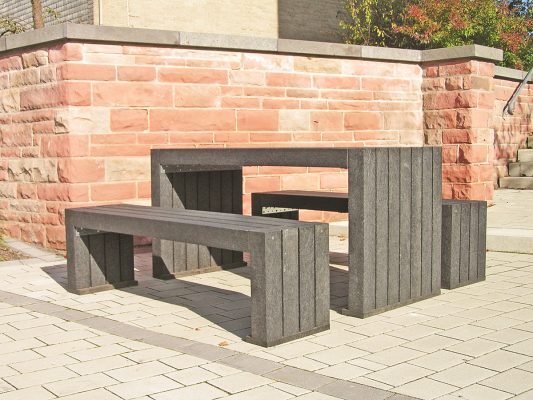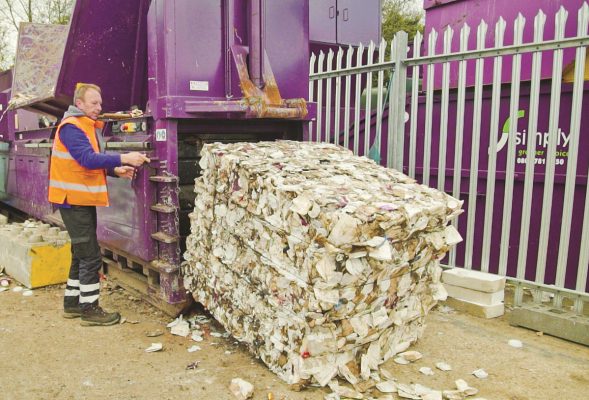
On an industrial estate next to Heathrow Airport, workers sort through disposable cups and glasses of all shapes and sizes – among them coffee cups discarded in street bins by Londoners on their way to work and pint-sized containers left on beer-stained stadium floors by soccer fans.
The cups are sorted by type, and tightly packed into bails that will soon be turned to pulp at a reprocessing plant.
In time, that pulp will be used to make new goods – pencils, rulers, notebooks, even picnic tables.
In recent years, much of this waste would have been exported to China, but China’s decision to stop importing other countries’ waste has shook the United Kingdom out of its complacency and forced it to address its failures to reduce waste and recycle it.
The Simply Cups recycling project, a partnership between environmental company Closed Loop UK and waste management enterprise Simply Waste Solutions, is the first scheme in Britain to add value to the disposable cup.
Coffee cups are the scourge of the waste industry in the UK. They are difficult and expensive to recycle because they require a specialized facility to separate the plastic lining from the paper outer section of the cup. Prior to the establishment of such a place five years ago, almost all of the 2.5 billion coffee cups that Britons discard each year were either buried or burned.
By bringing together stakeholders and orchestrating a system in which cups are collected, pulped, and made into new products, Simply Cups has ensured that 1 percent of those discarded cups are now recycled. It is a drop in the ocean, but a start, said Peter Goodwin, director of Closed Loop UK.
Closed Loop initiated a similar scheme that helped take plastic bottle recycling rates in the UK from 3 percent in 2001 to almost 50 percent today.
According to Goodwin, these schemes are what Britain needs urgently, now that China has stopped accepting foreign garbage.
On Jan 1, China halted imports of mixed paper and post-consumer plastic products from the UK and other nations, due to concerns about the environment and capacity constraints.
“What the Chinese announcement has highlighted is the real capacity gap that we have in the UK,” Goodwin said.
Cheaper recycling options abroad have led to the closure of hundreds of paper recycling mills in the UK since the 1970s.
One of Closed Loop’s plastic recycling centers had to shut down four years ago, when low oil prices made new plastic a cheaper option for manufacturers, and Britain exported record levels of scrap plastic to China as a result.
Up until this month, China was the main recipient of British exports of scrap paper and plastic.

In 2016, the UK exported slightly more than half of the 5 million tons of cardboard and paper collected in the country, according to the UK Environment Agency.
That same year, the UK collected more than 1 million tons of scrap plastic for reprocessing – only a third of that was recycled domestically, with the rest exported to other nations such as China.
Prior to the ban, the UK sent 1.4 million tons of mixed paper and cardboard a year to China. And environmental organization Greenpeace estimates that between 2012 and 2017, Britain sent 2.7 million tons of scrap plastic to China.
“Stuff is only recycled in the UK where there are systems in place that create value,” Goodwin said. “The waste that doesn’t have a system – which is the majority – is put into landfills, incinerated, or exported.”
Plastic waste is currently a hot topic in the UK. The issue of global plastic pollution reached a wide audience through the BBC documentary Blue Planet II. And media reports on the China ban let Britons know just how much of their waste went from their homes to other countries. A quarter of the scrap plastic sent from the UK to China originated in households.
UK Recycling Association Chief Executive Simon Ellin said the government had been “asleep at the wheel”prior to the debate in the media and among the public.
China began phasing in waste restrictions four years ago, before stopping most plastic and paper last July. Ellin wrote a letter to the government in September calling for urgent action in light of the ban.
In November, UK Environment Secretary Michael Gove was criticized when he told the Environmental Audit Committee he had “not given sufficient thought” to China’s looming ban. Two months later, Gove handed out reusable coffee cups to members of the British cabinet.
“I recognize that China’s decision will cause some issues in the short term for recycling in the UK,” Gove said in Parliament. “We will continue to work closely with industry, the Environment Agency, local authorities and all interested parties to manage those issues.”
This month, UK Prime Minister Theresa May delivered her first major speech on the environment, saying the government will target the nation’s “throwaway culture” and eliminate single-use plastics by 2042.
The waste export industry began reacting some time ago to the China ban. Viridor Resource Management stopped exporting waste from the UK to China last year, as did SUEZ Recycling and Recovery UK, which now channels exports into alternative markets in Asia and Europe. Waste management company Veolia UK said none of its plastic now leaves Europe.
Data for the third quarter of last year shows increases in UK exports of plastics to Turkey, Taiwan, Vietnam, and Malaysia and increases in exports of paper to Turkey, Taiwan, and Vietnam.
How much of the capacity that was once handled by China will now be taken up by other nations remains to be seen. Exporting to China is cheaper than exporting to most other nations because it benefits from a reverse logistics model in which waste exports fill empty shipping containers that had arrived in the UK from China full of imported goods that need to be shipped back, whether empty or full.
The fear is that landfill and incineration – as well as the illegal shipping of waste – will become more commonplace among nations with a lack of recycling infrastructure.
“Our recycling systems in the UK are ineffective – we urgently need more investment to build infrastructure and improve our collection systems,” Goodwin said.


